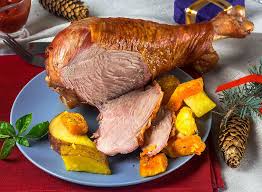Turkey meat is a delicious and nutritious option for meals. It comes from turkeys, which are large birds often associated with festive occasions like Thanksgiving. The meat is versatile and can be prepared in various ways, offering a range of flavors for different preferences.
One of the key features of turkey meat is its lean nature. This means it has less fat compared to some other meats, making it a healthy choice for those watching their fat intake. The lean quality also contributes to a slightly drier texture, but this can be addressed through proper cooking techniques.
When preparing turkey, there are different cuts to choose from, including the breast, thighs, and drumsticks. The breast is often considered the leanest part and is popular for roasting. It’s important to cook turkey thoroughly to ensure it reaches a safe internal temperature, reducing the risk of foodborne illnesses.
Turkey meat is a good source of protein, essential for building and repairing tissues in the body. It also provides important nutrients like iron, zinc, and B vitamins. Including turkey in a balanced diet can contribute to overall health and well-being.
One popular way to enjoy turkey is by roasting it with herbs and spices. This method enhances the natural flavors of the meat, creating a savory and aromatic dish. Turkey can also be grilled, smoked, or even ground to make burgers or meatballs.
Leftover turkey is another culinary opportunity. It can be used in sandwiches, salads, or soups. The versatility of turkey makes it a practical choice for meal planning, allowing for creative and delicious leftovers.
In addition to its culinary appeal, turkey meat is often praised for its role in promoting good health. It is a low-calorie option that fits well into various diets. Whether you’re aiming to maintain a healthy weight or simply enjoy a flavorful meal, turkey offers a satisfying option.
However, turkey meat is a versatile and nutritious choice for those seeking a delicious and health-conscious protein source. Its lean nature, coupled with the myriad ways it can be prepared, makes it a staple in many kitchens around the world. So, the next time you’re planning a meal, consider incorporating turkey for a tasty and wholesome dining experience.
Furthermore, turkey meat’s versatility extends beyond its traditional role in main dishes. Ground turkey, for instance, can be a substitute for beef in various recipes, providing a leaner option for dishes like tacos, chili, or spaghetti. This adaptability makes it a great choice for individuals looking to reduce their red meat intake while maintaining flavor and texture in their favorite recipes.
Turkey also shines in the realm of cultural cuisines. Many cultures around the globe incorporate turkey into their traditional dishes, adding unique spices and cooking methods that showcase the bird’s adaptability. From Turkish kebabs to Mexican turkey mole, the global culinary landscape embraces turkey in diverse and exciting ways.
Moreover, the health benefits of turkey extend beyond its nutritional profile. Research suggests that the amino acid tryptophan, present in turkey, may contribute to the production of serotonin, a neurotransmitter associated with mood regulation. While the infamous post-Thanksgiving meal drowsiness is often attributed to tryptophan, it’s worth noting that the overall combination of a hearty meal and relaxation likely plays a role.
Turkey farming practices also play a role in the overall appeal of turkey meat. Many producers focus on raising turkeys without the use of antibiotics or hormones, contributing to a perception of cleaner and more sustainable meat production. This aligns with the growing consumer interest in knowing where their food comes from and making environmentally conscious choices.
However, the popularity of turkey meat extends far beyond its association with festive occasions. Its lean and nutritious qualities, coupled with its adaptability in various culinary traditions, make it a staple for those seeking a healthy and flavorful protein source. As dietary preferences and awareness of food sources continue to evolve, turkey remains a reliable and enjoyable option for individuals and families looking to maintain a balanced and delicious diet.
Read Also: 19 Medicinal Health Benefits Of Cleavers (Galium aparine)
Preparation of Turkey Meat

Preparing turkey meat involves various methods, each bringing out unique flavors and textures. One common method is roasting, especially popular during festive occasions. To roast a turkey, preheat the oven, season the bird with herbs and spices, and place it in a roasting pan. Regular basting ensures the meat stays moist, and a meat thermometer helps achieve the recommended internal temperature.
Grilling is another flavorful option. Marinate turkey pieces in your favorite sauce or seasoning, then grill until fully cooked. The grill imparts a smoky flavor, enhancing the taste of the meat.
For a quicker option, turkey can be pan-seared or sautéed. Cut the meat into smaller pieces, season, and cook in a hot pan with a bit of oil. This method is ideal for stir-fries, salads, or when time is limited.
Smoking is a more elaborate technique, requiring a smoker and time. The slow cooking process infuses the turkey with a rich, smoky flavor. This method is popular for those who enjoy a more pronounced and distinct taste.
Ground turkey offers flexibility in the kitchen. Use it to make burgers, meatballs, or incorporate it into various recipes as a lean alternative to ground beef. The possibilities are vast, making it an excellent choice for diverse dishes.
Regardless of the preparation method, ensuring the turkey reaches a safe internal temperature is crucial. This not only guarantees food safety but also ensures the meat is cooked to perfection, maintaining its juiciness and flavor.
In addition, preparing turkey meat can be a delightful culinary adventure, whether you opt for roasting, grilling, pan-searing, smoking, or using ground turkey in creative dishes. Experiment with different seasonings and methods to discover your favorite way to enjoy this versatile and nutritious meat.
Uses of Turkey Meat

Turkey meat’s versatility extends to a wide range of culinary uses, making it a go-to ingredient for various dishes. Here are some popular applications:
1. Roasted Turkey: The classic centerpiece of festive meals, roasted turkey is often seasoned with herbs and spices, providing a delicious main course for Thanksgiving or other special occasions.
2. Turkey Sandwiches: Thinly sliced turkey is perfect for making sandwiches. Add your favorite condiments, veggies, and bread for a quick and satisfying meal.
3. Turkey Burgers: Ground turkey can be shaped into patties, seasoned, and grilled or pan-seared to create a healthier alternative to traditional beef burgers.
4. Turkey Stir-Fry: Cut turkey into strips and stir-fry with a medley of vegetables for a quick and nutritious meal. Add soy sauce or other flavorful sauces for extra taste.
5. Turkey Soups and Stews: Leftover turkey, especially from roasts, can be used to make hearty soups and stews. The rich flavors of the meat enhance the overall taste of the dish.
6. Turkey Tacos or Wraps: Seasoned ground turkey makes a tasty filling for tacos or wraps. Add your favorite toppings like lettuce, cheese, and salsa for a customizable meal.
7. Turkey Meatballs: Combine ground turkey with breadcrumbs, herbs, and spices to make flavorful meatballs. Serve them with pasta, in sandwiches, or as appetizers.
8. Turkey Chili: Swap out beef for ground turkey in chili recipes. It’s a leaner option that still provides a satisfying and hearty dish.
9. Turkey Salads: Add sliced or diced turkey to salads for a protein boost. It pairs well with various greens, veggies, and dressings.
10. Turkey Curry or Stir-Fry: Incorporate turkey into your favorite curry or stir-fry recipe for a unique twist. The meat absorbs the flavors of the spices, creating a delicious fusion dish.
These are just a few examples of the many ways you can incorporate turkey into your meals. Its adaptability and mild flavor make it a versatile ingredient suitable for a wide array of culinary creations.
Read Also: 19 The Medicinal Health Benefits of Reishi Mushroom (Ganoderma lucidum)
Economic Importance of Turkey Meat
The economic importance of turkey meat extends across various sectors, contributing significantly to both the agricultural and food industries. Here are key aspects of its economic significance:
1. Agricultural Sector: Turkey farming is a significant component of the agricultural sector. Farmers and producers engage in turkey rearing to meet the demand for turkey meat. This industry provides employment opportunities, supports rural economies, and contributes to the overall stability of the agricultural sector.
2. Employment Opportunities: The turkey industry creates jobs at different levels, from farm workers involved in raising and caring for turkeys to processing plant employees responsible for butchering, packaging, and distributing the meat. Additionally, there are jobs in transportation, marketing, and retail related to turkey products.
3. Food Processing Industry: Turkey meat processing is a substantial part of the food processing industry. Processing plants handle the transformation of live turkeys into various cuts and products ready for the consumer market. This adds value to the raw product and generates revenue for processing companies.
4. Export and Trade: Turkey meat is often exported to meet international demand. This contributes to a country’s export earnings and helps balance trade. Turkey farming and meat production can become key players in a nation’s export portfolio, fostering economic growth.
5. Retail and Consumer Markets: The sale of turkey meat in retail outlets, grocery stores, and markets is a significant driver of economic activity. Consumers purchasing turkey products contribute to the revenue of retailers, creating a demand-driven cycle that sustains the entire supply chain.
6. Diversification of Agriculture: Turkey farming provides farmers with the opportunity to diversify their agricultural activities. This diversification can be economically beneficial, helping farmers spread risks and stabilize incomes, especially in regions where turkey farming is viable.
7. Research and Innovation: The turkey industry often drives research and innovation in agriculture and animal husbandry. Efforts to enhance turkey breeds, improve feed efficiency, and optimize production processes contribute to the overall advancement of agricultural practices.
8. Tourism and Festive Occasions: Turkey meat is closely associated with festive occasions like Thanksgiving. Festivals and celebrations centered around turkey consumption can boost tourism and local economies as people engage in holiday-related activities and gatherings.
In summary, the economic importance of turkey meat is multifaceted, encompassing agriculture, employment, food processing, international trade, and more. Its impact extends beyond the farm gate, playing a vital role in supporting livelihoods and fostering economic development in various regions around the world.
Read Also: How to Grow Tomatoes in Containers

